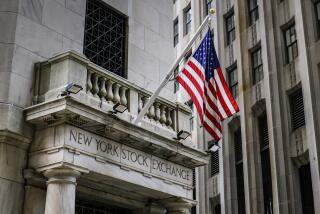Bond Yields Rise, Dollar Dips on News of Selling in China
The dollar fell further against the euro and Treasury bond yields rose Friday as reports that China might be shedding some of its U.S. debt holdings sparked fears of broader selling by foreign central banks.
But traders said thin post-holiday volume was exaggerating the market action.
The trouble started when China Business News quoted Yu Yongding, a member of the Chinese central bank’s monetary policy committee, as saying the country had trimmed its holdings of Treasuries in foreign exchange reserves to $180 billion, trying to minimize losses from the falling dollar.
Later, Yu said he had no knowledge of any government action on China’s reserves. But by then the damage was done.
The yield on the 10-year Treasury note rose to a two-week high of 4.23% from 4.20% on Wednesday. The 30-year T-bond yield jumped to 4.89% from 4.84% on Wednesday. Markets were closed Thursday in observance of Thanksgiving, and bonds traded for an abbreviated session Friday.
The euro ended in New York at a record high of $1.329, up from $1.324 in European trading Thursday. The dollar was mixed against other currencies, gaining against the yen, at 102.56 yen.
The dollar, which has mostly been declining against other major currencies since 2002, fell sharply this week after finance ministers of the so-called Group of 20 industrialized and developing nations met last weekend and voiced no official concern about the greenback’s slide.
European finance ministers have complained that the weak dollar is hurting European exporters. But many economists believe that the Bush administration wants the dollar to go lower to help U.S. exporters.
A falling dollar makes U.S. goods cheaper abroad while raising import prices.
A weak dollar also devalues the U.S. bond holdings of foreign investors.
Bank of England Chief Economist Charles Bean said Friday that international investors were unlikely to keep buying U.S. assets indefinitely, resulting in a “possibly substantial” drop in the dollar.
Russian central bank official Alexei Ulyukayev said three days ago that Russia might trim the share of dollars held in its foreign exchange reserves.
“What we’re seeing now is far more than just speculation. These are real fundamental shifts in portfolio allocations from official and private entities, and that could continue and see the dollar selling accelerate,” said Derek Halpenny, a currency strategist at Bank of Tokyo-Mitsubishi Ltd. in London.
Some global investors have been turning to gold as an alternative to the dollar.
Gold weakened a bit Friday in London trading after scoring its highest price since June 1988.
Gold was quoted at $452.25 an ounce after reaching $455 earlier in the day. Gold futures did not trade in New York on Friday.
More to Read
Inside the business of entertainment
The Wide Shot brings you news, analysis and insights on everything from streaming wars to production — and what it all means for the future.
You may occasionally receive promotional content from the Los Angeles Times.










